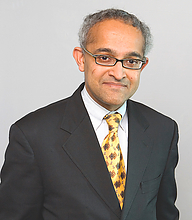Subrahmanian Accepts Endowed Professorship at Dartmouth College

A noted University of Maryland expert in data science and security issues is retiring from the university after 28 years and will continue his academic work as an endowed chair at Dartmouth College.
V.S. Subrahmanian, a professor of computer science with an appointment in the University of Maryland Institute for Advanced Computer Studies (UMIACS), will assume his new role at Dartmouth on Aug. 1, where he was named the Dartmouth College Distinguished Professor in Cyber Security, Technology, and Society.
Subrahmanian is also expected to take an active role in Dartmouth's Institute for Security, Technology, and Society.
Subrahmanian has established numerous scientific collaborations worldwide, using machine learning and other methods of big data analytics for predictive modeling on topics such as identifying malicious users and activities on social media, forecasting leadership changes in terrorist organizations, and determining the location of IED weapons caches in Iraq and Afghanistan.
He is recognized as a consummate educator, teaching thousands of Maryland computer science undergraduates over the years while simultaneously providing training and mentorship to dozens of graduate students and postdocs.
"V.S. Subrahmanian's scientific and scholarly impact at UMIACS, the university and within the academic community at large is significant," says Mihai Pop, professor of computer science and interim director of UMIACS. "He will be greatly missed at Maryland, but we expect his work will continue to resonate across academia, industry and government for years to come."
Subrahmanian joined the UMD Department of Computer Science as an assistant professor in 1989 and accepted an appointment to UMIACS in 1994, serving as its director from 2003 to 2010.
He launched the Laboratory for Cultural Computational Dynamics and the Center for Digital International Government, where researchers use the power of big data to address important societal issues involving public safety, international finance, cybersecurity and more.
Aaron Mannes, a science and technology policy fellow in the Department of Homeland Security’s Science and Technology Directorate, says that Subrahmanian’s use of cutting-edge data science and predictive analytics to model terrorism was “visionary.”
“V.S. was one of the first to bring together subject matter expertise and computer science in order to solve these very hard problems,” says Mannes, who has co-authored three books and numerous papers with Subrahmanian. “We are only beginning to see the impact of this approach, and V.S. will undoubtedly continue to be at the forefront of this revolution.”
Subrahmanian's research has been featured on PBS’s “NOVA” and “NBC Nightly News,” as well as The New York Times, The Washington Post, The Wall Street Journal and other major news outlets.
BTN LiveBIG highlighted Subrahmanian's work in developing sophisticated computer algorithms to predict the movement of endangered rhinos and elephants in Africa, helping protect the animals from illegal poaching.
Last fall, “PBS NewsHour” interviewed Subrahmanian on his research that uses big data analytics to predict the effects of leadership changes in terrorist networks.
“What drives much of my team's scientific work can easily be placed into three categories: accuracy in our data and in our predictions, explainability of our results and actionable insights drawn from our prediction models," says Subrahmanian.
A fellow of the American Association for the Advancement of Science and the Association for the Advancement of Artificial Intelligence, Subrahmanian has authored or co-authored 140 papers published in academic journals.
In 2016, he published the “The Global Cyber-Vulnerability Report,” which analyzed more than 20 billion reports generated by 4 million computers (mostly personal and business machines) in 44 countries.
Over the years, the Defense Advanced Research Projects Agency, U.S. Army, U.S. Navy, and other organizations and agencies have funded Subrahmanian's research.
